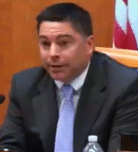From left: Commissioners Mignon Clyburn, Michael O’Rielly and Jessica Rosenworcel. Photos by Leslie Stimson, Inside Towers
FCC Chairman Ajit Pai has been intent on reforming the agency’s Lifeline program and Commissioners voted to do that Thursday, by reassessing where the communications subsidies for low-income consumers are needed. The subsidies got to participating carriers based on how many participants they sign up. Several of the changes voted on concern carriers on Tribal lands. The changes come after the GAO released a report this summer exposing waste, fraud and abuse in the program.
Commissioners Mignon Clyburn and Jessica Rosenworcel called the changes “cruel and heartless.” Clyburn said she dressed in black to “mourn for the typical Lifeline recipient,” a middle-age single mother who lives in poverty and has a dead-end, minimum-wage job. Rosenworcel said the changes “are not real reform.”
Commissioners Brendan Carr cited the GAO report that said over 6,000 individuals reported dead by the Social Security Administration are on the Lifeline rolls and 10,000 recipients are listed at the same address. Michael O’Rielly said, “Consumers are paying more on their phone bill each month to subsidize those who would have signed up for another phone service anyway.”
Pai, meanwhile reminded his colleagues that Congress told him Lifeline needs to change and Tribes he consulted with support the changes voted on yesterday. Among other things, the order changes FCC rules to incentivize deployment on Tribal lands by limiting “enhanced” Tribal Lifeline support – $25 monthly in addition to the standard $9.25 per household – to facilities-based providers. They would also lift restrictions that barred Lifeline consumers from switching carriers for a year and clarifies that Lifeline support is only available for mobile broadband at 3G or better levels.
Speaking to reporters after the meeting, Pai said he recently met with a member of a tribe in New Mexico who said: “We need infrastructure. We’re lucky if we can get 2G in parts of our reservation.” Tribes from Alaska, Washington State, Oregon and New Mexico, for example, “support what we did,” said Pai.
In a separate Notice of Proposed Rulemaking, the Commission asks whether the program should be capped financially, and if so, at what level. This sparked a lot of discussion, with O’Rielly defending the notion of a budget.
On the Hill, reaction was swift. Sen. Roger Wicker (R-MS) approved, saying, “By its action, the FCC is taking steps to ensure states have a say in the Lifeline program.” House Energy and Commerce ranking member Frank Pallone (D-NJ) said the move “demonstrates the FCC’s relentless desire to please the corporate interests, and is troubling considering that we have a critical net neutrality vote coming up next month.”
November 20, 2017







Reader Interactions